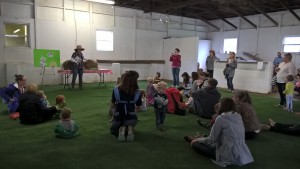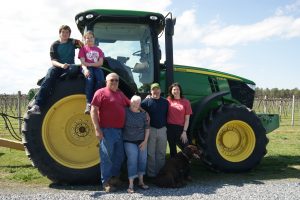Farm-related jobs exceed graduates in the field
Maryland Soybean Board debuts farm career website
SALISBURY, MD. (May 31, 2016) – Agriculture – no pun intended – is a growing field.
Over the next five years, college graduates with degrees related to food, agriculture, renewable natural resources or the environment can expect to see an average of 57,900 job openings annually – far more than the anticipated 35,400 graduates in those fields, the USDA reports.
In order to attract students to careers in agriculture, the Maryland Soybean Board tapped an old friend for help: Glycine Max.
 Known casually as “Max” (his full name is based on the botanical name for soybeans), the character is the star of a booklet tracing his life as a young sprout and hailing the scores of uses to which he contributes throughout his life. The booklet, designed for third, fourth and fifth grade students, is provided free to Maryland classrooms. More than 300,000 students have “met” Max since his introduction.
Known casually as “Max” (his full name is based on the botanical name for soybeans), the character is the star of a booklet tracing his life as a young sprout and hailing the scores of uses to which he contributes throughout his life. The booklet, designed for third, fourth and fifth grade students, is provided free to Maryland classrooms. More than 300,000 students have “met” Max since his introduction.
Now Max is following those students who met him in middle school into the higher grades – sixth, seventh and eighth – where he helps them consider various career choices through a new website: www.maxcareers.info
“Maryland agriculture needs bright young minds to pursue farm careers,” says William Layton, chairman of the Maryland Soybean Board and a farmer from Vienna, Md. “With less than two percent of Americans involved in farming, we have to work at attracting students back to agriculture and getting the education to prepare them to serve Maryland’s number one industry.”
In a quick survey process, Max offers several scenarios with six questions. Students choose one answer in each scenario. The answers lead to placement of the student in one of six personality types – realistic, investigative, artistic, social, entertaining or conventional. In the Realistic personality type, career choices involving hands-on activity emerge, such as farming and driving a truck. For an Investigative personality type, suggested career choices include soil scientist, ag researcher or seed developer.
From there, the students will learn about careers based on their interests. All told, 36 possible career areas, covering a broad spectrum of human activity, emerge from the program.
At the completion of the program, Max awards the students a certificate acknowledging their participation and urging them to continue to “follow your dream.”
The Max booklet entitled “Just the Beginning–The Life of a Young Sprout” is available from www.maxthesprout.com
About Maryland Soybean Board: The Maryland Soybean Board administers soybean checkoff funds for soybean research, marketing and education programs in the state. One-half of the checkoff funds stay in Maryland for programs; the other half is sent to the United Soybean Board. To learn more about the Maryland Soybean Board, visit www.mdsoy.com.
# # #
For More Information:
Sandra Davis, Executive Director
Office: 410.742.9500
sdavis26@verizon.net
For Maryland Farmers, Every Day is Earth Day
Three times a week, I go out running around a path that I made around three of my soybean fields. Not a single day goes by that I don’t think about the connection between this land and my family.
Earth Day is a day when we all think about the environment, when we look at how we take care of the land and how to leave it in better condition than we found it.
Every day is Earth Day to a farmer. Taking care of the land is my job and my passion. My land is my heritage, my inheritance, my business, my recreation, my safe haven, and my retirement.
No one poisons the well they drink from, and farmers are no exception. Good, clean, productive land is how I feed my children and will put them through college. I may have a piece of paper that says that I own the land, but I know that I am only a caretaker. The land was here long before me, cared for by many generations. I expect it will be here long after me, cared for by my children and their children.
Maryland farmers, as a group, are the most progressive and environmentally minded in the nation. This year, we once again broke the record for cover crop acres planted – one of the most effective ways to protect both our land and the Chesapeake Bay.
We’re far ahead of other milestones set for the Bay, too, including planting streamside forest and grass buffers, retiring highly erodible land, and constructing storage for animal manure, which is an important source of organic nutrients for our crops.
We’ve got soil conservation and water quality plans on half of Maryland’s tillable acres and have embraced the manure transport program, moving four times the amount of manure than the goals prescribed.
I often hear, “Sure family farmers take care of their land, but what about corporate farms?” I don’t know of a single farm that isn’t a family farm (and I know a lot of farmers). Family farms – owned by brothers, by a father and son or daughter, by a husband and wife, or by cousins – often will incorporate for legal or financial reasons. The USDA says that 97 percent of farms in the United States are family-owned operations.
Sometimes these farms are large, because farms, like every other business, have to grow to survive. You can’t go out and make a good living on 100 acres like you could in my grandfather’s day. Today it’s more like 2,000 acres or more for corn and soybean growers.
How can farms that large take care of the land adequately? Technology and innovation. Today it’s possible to do a better job with 3,000 acres than my grandfather could with 100. We no longer have to plow the land, which destroys the structure and biology of the soil and leaves it open to erosion. GPS technology allow us to treat every single acre individually.
Ask a farmer anything about his land, the littlest detail, and he’ll know it. Ask where there are problems with grasses, or pigweed, or marestail, and he’ll know. Ask where the wet spots are, or spots that get as hard as concrete in the summer. Ask where water runs off the land, and where it will pond up. A farmer knows his farm like the back of his hand. Most will tend every acre four or more times a year, planting, scouting, fertilizing, killing weeds and harvesting.
My family has owned the farm I live on for 68 years now. Three generations of Laytons have all been raised in the same house, on the same land. When I watch the sun rise over the fields each morning, I know the only thing more important to me than my land is my family.
Enjoy Earth Day, and make a pledge to see firsthand how farmers make every day Earth Day. We welcome you to visit our farm, or suggest MarylandsBest.net to locate farms near your home to visit, where you can see land and water quality efforts in action.
William H. Layton
Chairman, Maryland Soybean Board william@laytonschance.com
William Layton, his wife Jennifer and his father Joe raise soybeans, corn, wheat and grapes on a 1,300-acre farm in Dorchester County, MD. The family opened Layton’s Chance Winery in 2010.
Baltimore Parents Will Cheer Soy-Backed Synthetic Lawn
Baltimore, MD. (APRIL 05, 2016) – The fields around the Baltimore County Center for Maryland Agriculture and Farm Park aren’t the only things greening up this spring. Inside the Exhibit Barn, a soft green synthetic “lawn,” featuring a soy-based backing, has sprung up.
And that is going to make local parents happy. Why? “The old floor was dirt,” explains Bronwyn Mitchell, the farm park manager. “In addition to  being used during our annual fairs, the Exhibit Barn serves as an auxiliary classroom space for Farm Sprouts Preschool and Farm Camps, and the kids had to sit on the dirt floors. And that means they sometimes went home with dirty pants.”
being used during our annual fairs, the Exhibit Barn serves as an auxiliary classroom space for Farm Sprouts Preschool and Farm Camps, and the kids had to sit on the dirt floors. And that means they sometimes went home with dirty pants.”
Thanks to a grant from the Maryland Soybean Board’s Green Events Program, the soy lawn product known as Syntipede 354 from a company called SYNLawn, was installed March 31.
Synthetic lawn products like Syntipede and AstroTurf represent a growing market for soybean oil, which is used to create a backing that locks the synthetic grass fibers in place. In 2015, AstroTurf was installed on 300 athletic fields across the U.S. It takes the soybean oil from approximately five acres of soybeans to produce the backing for a typical field. In Maryland, farmers grow about a half a million acres of soybeans, producing more than 20 million bushels of beans each year.
“Soy-based products often provide superior quality and performance than petroleum-based products and they support our family farmers,” says William Layton, chairman of the Maryland Soybean Board. “Through a variety of research and promotion programs, the soybean checkoff has fostered the creation of hundreds of soy-based products over the last two decades.”
Soybean oil displaces about 60 percent of the petroleum-based polyurethane in BioCel, the backing material used by SYNLawn, according to Underwriters Laboratories certification.
Soybeans offer an abundant, domestically produced and renewable supply of ingredients, offering companies the opportunity to reduce the petroleum content in commercial and industrial products. The soy checkoff partners with manufacturers to commercialize new soy-based products, giving farmers and others even more opportunities to buy products that contain U.S. soy. To find soy-based products, visithttp://www.soybiobased.org.
MSB’s Green Events Program provides grants to agricultural fairs and expos through a competitive process which begins with a request for proposals in the fall. More information is available on the board’s website at https://www.mdsoy.com.
About Maryland Soybean Board: The Maryland Soybean Board administers soybean checkoff funds for soybean research, marketing and education programs in the state. One-half of the checkoff funds stay in Maryland for programs; the other half is sent to the United Soybean Board. To learn more about the Maryland Soybean Board, visit https://www.mdsoy.com.
Maryland Soybean Board Wins Maryland Cattlemen’s Association Award
Hagerstown, MD. (March 29, 2016) – The Maryland Soybean Board received the Top Hand Award from the Maryland Cattlemen’s Association during its annual convention earlier this month.
The Top Hand Award recognizes an individual or organization that has contributed significantly to the benefit of the Maryland cattle industry.

On behalf of the Maryland Soybean Board, Alan Hudson, a MSB director and a farmer from Berlin, Md., accepted the Top Hand Award from the Maryland Cattlemen’s Association’s director Dr. Scott Barao.
“The Maryland Soybean Board is pleased to accept the 2016 Top Hand Award from the Maryland Cattlemen,” said Chairman William Layton. “Agriculture is Maryland’s top industry. We seek opportunities to work with our fellow farmers to build a stronger industry and celebrate the contributions of agriculture toward Maryland’s environment, economy and quality of life.”
Livestock and poultry consume more than 98 percent of domestic soybean meal. The soybean board supports those industries with programs that include opportunities for farmers to train as spokespeople on behalf of agriculture. One part of this program, CommonGround, supports farm women reaching out to their non-farming peers.
The Maryland Soybean Board:
- Shares both an environmental audit and economic analysis of animal agriculture produced by the United Soybean Board and customized to each state.
- Sponsors the annual cattlemen’s Youth Skill-A-Thon and youth livestock shows in Central and Southern Maryland.
- Launched the consumer outreach campaign, “My Maryland Farmers,” at the 2015 Maryland State Fair, featuring local farmers and facts about their farms and Maryland agriculture.
This year, the soybean board funded more than $228,000 in research projects. It also promotes the use of soy-based products through an annual competitive grant program to county fairs and agricultural expos.
Ten Maryland farmer-directors lead the Maryland Soybean Board: William Layton of Vienna, chairman; Travis Hutchison of Cordova, vice chairman; Danny Saathoff of Denton, treasurer; Alan Hudson of Berlin; Randy Stabler of Brookeville; Linda Burrier of Union Bridge; Josh Appenzeller of Millington; Bill Langenfelder of Worton; Jeffrey Griffith of Lothian; and Brian Johnson of Westover.
About Maryland Soybean Board: The Maryland Soybean Board administers soybeancheckoff funds for soybean research, marketing and education programs in the state. One-half of the checkoff funds stay in Maryland for programs; the other half is sent to the United Soybean Board. To learn more about the Maryland Soybean Board, visit www.mdsoy.com.
# # #
For More Information:
Sandra Davis, Executive Director
Office: 410.742.9500
sdavis26@verizon.net
Archives
No Results Found
The page you requested could not be found. Try refining your search, or use the navigation above to locate the post.

